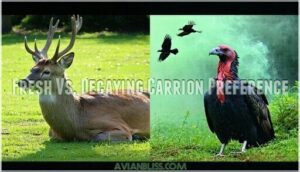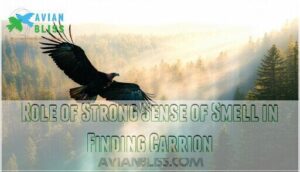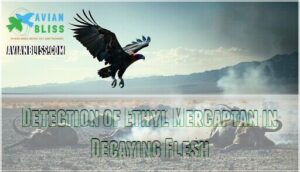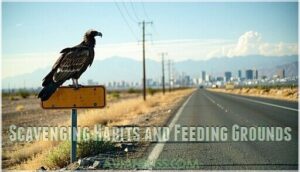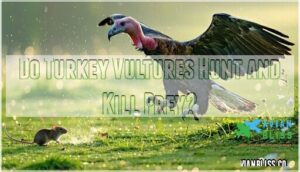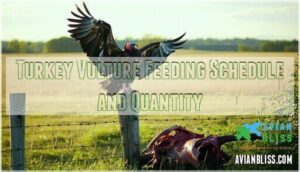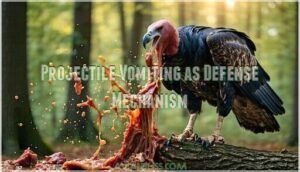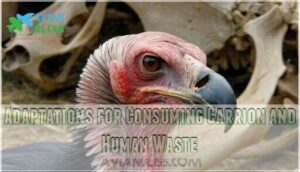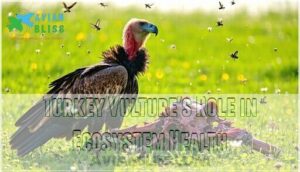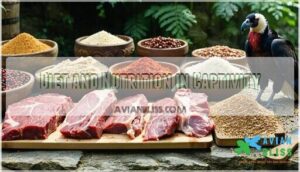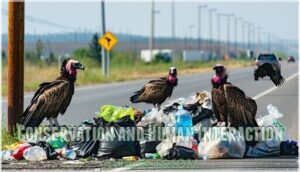This site is supported by our readers. We may earn a commission, at no cost to you, if you purchase through links.
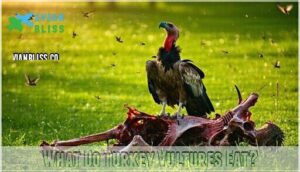
These scavengers can detect decaying flesh from miles away, making roadkill and naturally deceased wildlife their primary food sources.
While they’re often called "buzzards," they rarely hunt live prey, preferring to let other predators do the hard work.
You might spot them picking through garbage dumps too, as they’ll consume human waste when available.
Their powerful stomach acid neutralizes harmful bacteria, making them perfectly adapted for their somewhat gross but essential ecological role.
There’s more to their fascinating feeding habits than meets the eye.
Table Of Contents
- Key Takeaways
- Turkey Vulture Diet Overview
- What Do Turkey Vultures Eat?
- Carrion Consumption Habits
- Scavenging Habits and Feeding Grounds
- Do Turkey Vultures Hunt and Kill Prey?
- Turkey Vulture Feeding Schedule and Quantity
- Unique Eating Habits and Adaptations
- Turkey Vulture’s Role in Ecosystem Health
- Diet and Nutrition in Captivity
- Conservation and Human Interaction
- Frequently Asked Questions (FAQs)
- What is a turkey vulture’s favorite food?
- Are turkey vultures bad to have around?
- Will a turkey vulture pick up a small dog?
- Do turkey vultures eat carrion?
- What do turkey vultures eat?
- What do vultures consume?
- Do turkey vultures eat dead animals?
- Why do turkey vultures eat other animals?
- Do turkey vultures eat garbage?
- What is a turkey vultures favorite food?
- Conclusion
Key Takeaways
- You’ll find that turkey vultures are nature’s cleanup crew, feeding almost exclusively on fresh carrion they detect through their incredible sense of smell that can locate decaying flesh from miles away.
- You can expect these scavengers to consume 5-7 ounces of meat daily when available, but they’re remarkably adaptable and can survive up to 17 days without eating during food shortages.
- You’ll discover their diet isn’t limited to dead animals—they’ll occasionally eat fruits, vegetables, roadkill, and even human waste from landfills, showcasing their opportunistic feeding habits.
- You should appreciate their vital ecological role since their powerful stomach acid neutralizes deadly bacteria like anthrax and botulism, preventing disease spread while maintaining ecosystem balance.
Turkey Vulture Diet Overview
Turkey vultures have a peculiar diet that’s centered around carrion, or the flesh of dead animals, which they locate using their exceptional sense of smell.
Their eating habits vary by region, season, and even human activity, making them unique and adaptable scavengers in the ecosystem.
Main Sources of Food
Turkey vultures have a fascinating diet that centers on their role as nature’s cleanup crew.
Their favorite meals often include:
- Fresh carrion, from animals like mammals, birds, and reptiles.
- Occasionally, plant consumption—decaying vegetation or even human waste.
- Roadkill, which is common near urban or rural areas.
These resourceful scavengers excel at finding meals using sharp senses, particularly an extraordinary sense of smell, ensuring ecosystems remain clean and balanced.
Regional Diet Variation
Scavenging pros, these birds adapt their eating habits to nature’s menu.
Their diet varies widely by region:
- California Diet: Rabbits, reptiles, and cattle form their carrion staples.
- Texas Diet: Rabbits, reptiles, and birds dominate their plate.
- Wisconsin Diet: Deer, skunks, and cattle are key food sources.
- Coastal Feeding: Washed-up fish and whale carcasses keep them fed.
This regional diet variation showcases their knack for survival—nimble eaters, they thrive on what’s available, from roadkill to sea-life leftovers.
Thermals guide their daily hunt for carrion.
Dietary Variation According to Season
As the seasons shift, so does the turkey vulture’s diet.
During warm months, they capitalize on plentiful roadkill, insect availability, and coastal carrion, showcasing their flexibility in foraging habits.
Migration patterns also influence their seasonal diet variation, with vultures feasting on crops or smaller prey when carrion is scarce.
Winter’s harsher conditions often limit vulture food sources, leading them to focus on what’s available, and these fascinating seasonal feeding habits highlight what vultures eat to survive year-round, with a diet that includes carrion and requires flexibility in foraging.
Impact of Human Interaction on Diet
Faced with habitat loss and an abundant supply of roadkill, turkey vultures have adapted impressively to urban environments.
Their diet now includes human waste and scraps from landfills, showcasing their resilience.
While they’re essential for cleaning decomposition, urban adaptation isn’t without risks, like poisoning from toxins in waste.
These scavengers thrive where others struggle, transforming cities into feeding grounds and finding opportunity in what we throw away—remarkable, but not without challenges.
What Do Turkey Vultures Eat?
You’d be amazed by how versatile a turkey vulture’s diet is, ranging from freshly dead animals to fallen fruits.
These scavengers thrive by cleaning up what others leave behind, playing a pivotal role in the ecosystem.
Carrion as Primary Food Source
Think of them as nature’s recyclers, tackling waste one carcass at a time.
Turkey vultures rely on carrion freshness to select meals, preferring recently deceased animals over rotting remains.
Their exceptional sense of smell pinpoints regional carrion, guiding them to varied carcass sizes.
These unique birds even ingest small bones as part of their diet.
By consuming carrion at different decomposition stages, they help keep ecosystems balanced and disease-free.
Omnivorous Nature and Plant Consumption
When meat’s off the menu, turkey vultures occasionally go green.
Their omnivorous side shines as they explore plant matter, giving their diet a surprising twist.
- Fruit consumption: They nibble on pumpkins, coconuts, and berries.
- Vegetation intake: Seasonal eating includes crops like squashes or even rotten vegetables.
- Plant variety: Turkey vultures adapt to nature’s buffet, proving their diet’s as versatile as their scavenging skills!
Human Waste and Garbage Consumption
Turkey vultures are masters of landfill scavenging, turning trash into meals while helping with waste decomposition.
Their urban adaptation means they frequent garbage dumps, trash bins, and even consume sewage—though it’s not glamorous, it’s vital for public health.
With a diverse vulture diet of carrion and human-generated waste, these scavengers process harmful substances like plastic or infected meat using strong stomach acids.
By cleaning up decay, the turkey vulture diet plays an essential role in maintaining cleaner ecosystems and reducing disease spread, which is a result of their efficient waste decomposition and landfill scavenging abilities, ultimately supporting public health through their actions.
Fruits and Vegetation Consumption
Surprising many, turkey vultures occasionally venture beyond carrion, adding fruits and plants to their menu.
This quirky adaptation enhances their vulture diet carrion by filling gaps when meat is scarce.
Their fruit digestion also aids nature’s cycles.
- Berry munching boosts energy.
- Pumpkins provide essential nutrients.
- Coconuts tantalize taste buds.
- Seasonal availability drives crop raiding.
- Grazing helps access nutritional value.
This flexible palate guarantees survival in shifting environments.
Carrion Consumption Habits
You might find turkey vultures a bit picky in regard to their meals—they prefer fresh carrion over heavily decayed remains.
Their incredible sense of smell helps them locate rotting carcasses, even detecting gases like ethyl mercaptan from miles away.
Fresh Vs. Decaying Carrion Preference
In the context of carrion, you could say turkey vultures are dining connoisseurs.
They prefer fresh corpses over heavily decaying flesh, guided by keen senses and palatability factors.
As microbial activity increases on older carcasses, toxins accumulate, making the meal less appealing.
Freshness guarantees higher nutritional value, keeping these scavengers well-fed while maintaining their critical role in balancing the ecosystem’s decay stage.
Role of Strong Sense of Smell in Finding Carrion
A turkey vulture’s incredible sense of smell isn’t just an advantage—it’s survival in action.
Unlike most birds that rely on vision, turkey vultures detect carrion through gases like those released during early decomposition.
Their large olfactory bulbs are fine-tuned for this task, allowing them to find meals even under dense forest canopies.
- Smell vs. Vision: Smell dominates for finding food.
- Olfactory Bulb Size: Larger than other scavengers.
- Foraging Flight Patterns: Fly low, winding to catch scent trails.
Detection of Ethyl Mercaptan in Decaying Flesh
Ever wonder how carrion signals its presence?
Ethyl mercaptan—a decomposition gas—acts as nature’s dinner bell for turkey vultures.
These scavengers excel with olfactory receptor sensitivity that detects ethyl mercaptan even across vast ranges.
They instinctively target specific decomposition stages, ignoring older carcasses.
Environmental factors, like wind, enhance their evolutionary advantage over rivals.
| Factor | Effect | Vulture Skill |
|---|---|---|
| Wind Direction | Amplifies mercaptan range | Precise carrion detection |
| Decomposition Gas | Attracts vultures | Olfactory accuracy |
| Decay Stage | Guides feeding habits | Stage-specific eating |
Scavenging Habits and Feeding Grounds
You’ll often spot turkey vultures feeding in wide-open spaces where carrion is easy to find, such as roadsides or open fields.
They also take advantage of urban areas, abandoned nests, and ledges to scavenge for their next meal.
Where Do Turkey Vultures Feed?
Turkey vultures have a knack for finding meals in unexpected spots.
These feathered scavengers turn the world into their personal buffet, discovering dinner where others see decay.
Their feeding grounds are diverse but purposeful:
- Forests provide carrion hidden under tree canopies.
- Coastal areas reveal washed-up fish and marine mammals.
- Farmlands offer livestock remains.
- Open fields allow easy carrion spotting.
By adapting to such varied habitats and staying near water sources, these scavengers help maintain ecosystems, proving how resourceful vulture feeding habits truly are.
Roadkill and Urban Areas as Feeding Grounds
Urban areas are like all-you-can-eat buffets for turkey vultures, thanks to Roadkill Abundance from human Encroachment.
These scavengers make the most of Carcass Accessibility near highways, where carrion is plentiful.
- Rely on their sharp sense of smell to locate roadkill quickly.
- Adapt well to cities, turning urban landscapes into feeding zones.
- Reduce Disease Transmission by cleaning up decaying carcasses.
- Often seen soaring above busy streets, searching for their next meal.
Their feeding habits highlight nature’s waste management team.
Use of Abandoned Nests and Ledges as Feeding Sites
How do these skilled scavengers make the most of abandoned nests and ledges? By turning them into perfect feeding spots:
- Nest Site Scavenging guarantees efficient use of energy by repurposing existing sites.
- Ledge Carrion Access provides safety from ground predators while feasting.
- Urban Nest Feeding and cliffside spots offer high vantage points to scout for food.
- Nest Proximity Food allows quick retreats if threatened.
These clever adaptations highlight the resourceful vulture eating habits, showcasing a diet centered on carrion scavenging in unconventional places.
Do Turkey Vultures Hunt and Kill Prey?
You might be surprised to learn that turkey vultures rarely hunt or kill live prey, relying almost entirely on scavenging for food.
However, in rare cases, these birds may opportunistically target weak or vulnerable animals, showing just how adaptable they can be.
Rare Instances of Hunting and Killing Prey
Soaring high, turkey vultures aren’t the fierce hunters you might imagine. They’re opportunistic feeders, focusing on scavenging but occasionally showing limited hunting behavior.
When food is scarce, they might target vulnerable prey like sick or immobile animals. Their hunting style is far from aggressive—it’s survival-driven and requires minimal effort.
Reports of opportunistic predation include hatchling interception or chick harassment, where vultures target freshly hatched or weakened birds. Unlike raptors, they lack strong talons, relying on sharp beaks to manage smaller animals.
However, this behavior is rare, making them marginal predators. Why hunt when nature’s buffet offers ample food? Their vulture food preferences lean heavily toward carrion, but these rare moments of predation highlight their adaptability to challenging circumstances.
Reliance on Carrion and Scavenging for Food
Unlike Hollywood’s dramatic predator scenes, you’ll find turkey vultures are nature’s ultimate recycling specialists.
These efficient scavengers depend almost entirely on carrion rather than hunting live prey:
- Carcass Decomposition provides their primary nutrition source through strategic scavenging
- Scavenging Competition with other vultures shapes their feeding behavior patterns
- Disease Control benefits emerge as they consume potentially harmful decaying matter
Importance of Strong Sense of Smell in Finding Prey
Precision drives turkey vultures’ remarkable olfactory receptor genes, enabling them to detect ethyl mercaptan from decaying carrion miles away.
You’ll find their brain region activation creates an invisible map through odor plume tracking.
This extraordinary sense of smell transforms scavenging behavior into scientific artistry, allowing efficient carrion location efficiency that puts bloodhounds to shame.
Their carrion consumption success depends entirely on this vulture diet superpower.
Turkey Vulture Feeding Schedule and Quantity
You’ll find that turkey vultures maintain a surprisingly flexible eating schedule, consuming approximately 5 to 7 ounces of meat daily when food is available.
These efficient scavengers can actually survive without eating for up to 17 days by storing food in their expandable crops, which allows them to adapt their feeding patterns based on carrion availability in their territory, making them highly efficient scavengers.
Daily Food Intake and Consumption Patterns
Turkey vultures display fascinating daily food intake patterns that reveal their survival mastery.
When you observe their feeding frequency, you’ll notice remarkable adaptability.
- Daily meat intake averages 5-7 ounces in captivity
- Wild diet varies dramatically based on carrion availability
- Seasonal consumption shifts occur with migration patterns
- Carrion consumption can be postponed up to 17 days during scarcity
Time of Day for Foraging and Eating
Early morning hours bring turkey vultures to life as they prepare for their daily foraging expeditions.
You’ll notice these carrion birds diet follows predictable patterns throughout the day.
They begin searching for food once thermal updrafts develop, typically mid-morning when warm air currents lift them effortlessly skyward.
| Time Period | Activity | Energy Usage | Success Rate |
|---|---|---|---|
| Early Morning | Roost departure | Low | Variable |
| Mid-Morning | Active hunting | High | Moderate |
| Afternoon | Peak foraging | Highest | High |
| Evening | Roost return | Low | Low |
Afternoon represents their most productive hunting window.
Turkey vultures maximize thermals during peak heating hours, allowing extensive territory coverage with minimal energy expenditure.
Evening brings roost return as temperatures drop and updrafts weaken, ending their systematic search for carcasses.
Impact of Food Availability on Feeding Schedule
When carrion abundance drops dramatically, you’ll notice turkey vultures shift their entire daily routine.
These adaptable scavengers extend foraging hours during seasonal variation, competing fiercely for limited corpses.
Migration impact forces them toward urban food sources like roadkill.
Corpse competition intensifies as vulture diet facts reveal their remarkable flexibility—turkey vultures can survive weeks without eating when vulture carrion consumption opportunities vanish completely, showcasing their remarkable flexibility and ability to endure without food for extended periods, a testament to their adaptable nature.
Unique Eating Habits and Adaptations
You’ll find that turkey vultures possess remarkably unusual eating adaptations that seem almost unnatural, including the ability to projectile vomit partially digested carrion up to 10 feet as a defense mechanism.
Their digestive systems contain stomach acid so powerful it can neutralize dangerous bacteria and toxins found in rotting flesh, allowing them to safely consume carcasses that would kill most other animals, due to their ability to consume rotting flesh.
Projectile Vomiting as Defense Mechanism
When you encounter turkey vultures feeling threatened, you’ll witness nature’s most disgusting defense mechanism: projectile vomiting.
These clever scavengers launch their stomach contents up to ten feet with remarkable ejection distance, creating an effective predator deterrent.
The vomit composition contains acidic, partially digested carrion that repels attackers.
This evolutionary advantage transforms their bizarre diet into a survival tool that keeps vultures safe.
Strong Stomach Acid and Digestive System
While projectile vomiting keeps threats at bay, you’ll find turkey vultures’ digestive systems are equally impressive.
Their stomach acid reaches pH levels that’d make your car battery jealous, creating an acids composition powerful enough to neutralize deadly bacteria like botulism and anthrax.
This vulture scavenger diet requires extreme bacterial resistance and lightning-fast digestion speed.
- Bone digestion capabilities dissolve small bones completely
- Crop storage allows food hoarding for up to 17 days
- Stomach acid destroys pathogens that’d kill other carrion feeders
Adaptations for Consuming Carrion and Human Waste
Turkey vultures possess extraordinary adaptations that transform them into nature’s most efficient cleanup crew.
Their bald heads prevent bacteria buildup while feeding on carrion, and urohidrosis benefits include cooling through leg defecation.
Weak feet use forces ground-based scavenger dining, while digestive immunity destroys pathogens that would kill other animals.
- Bald head advantage: Prevents feather contamination during messy carrion consumption
- Urohidrosis cooling system: White leg appearance from strategic waste elimination
- Carrion softening patience: Waits for decomposition to access tough carcasses
- Digestive immunity fortress: Stomach acid neutralizes deadly bacteria and toxins
Turkey Vulture’s Role in Ecosystem Health
You mightn’t realize it, but turkey vultures serve as nature’s cleanup crew, preventing dangerous bacteria and diseases from spreading through decomposing animal carcasses.
Without these efficient scavengers consuming roadkill and dead wildlife, you’d face increased health risks from pathogens that thrive in rotting flesh.
Prevention of Disease Spread Through Carrion Consumption
When turkey vultures consume carrion, their acidic digestion benefits create a powerful disease filtration system.
Their unique vulture gut microbiome neutralizes deadly pathogens like anthrax and cholera before they spread.
This disease filtration efficiency protects public health by eliminating contaminated carcasses that could infect wildlife, livestock, and humans.
Their environmental role makes them essential disease-prevention heroes.
Importance of Turkey Vultures in Maintaining Ecosystem Balance
You’ve probably never thought about it, but these feathered cleanup crews are ecosystem superheroes working behind the scenes.
Their scavenger role provides critical ecosystem services that keep nature balanced and healthy.
- Disease control: Carrion consumption prevents harmful bacteria from spreading through water and soil systems
- Nutrient cycling: Breaking down carcasses returns essential minerals to the environment faster
- Biodiversity impact: Their environmental role as scavenger birds supports entire food webs
- Disease prevention: Removing decaying matter reduces pathogen transmission to wildlife and livestock
Impact of Turkey Vulture Population on Ecosystem Health
When you observe turkey vulture populations in your area, you’re witnessing nature’s disease control specialists at work.
These scavenger birds regulate ecosystem health through efficient carrion removal, preventing dangerous pathogen spread while supporting nutrient cycling.
Population regulation among vultures directly impacts scavenger competition, creating balanced feeding opportunities that maintain environmental stability and protect community health.
Disease Prevention
Diet and Nutrition in Captivity
When you visit a zoo, you’ll find that turkey vultures can’t simply feast on roadkill like their wild counterparts, so caretakers must carefully craft diets that meet their unique nutritional needs.
You’ll discover that replicating a scavenger’s natural diet presents fascinating challenges, as zookeepers balance fresh meat portions with essential vitamins to keep these remarkable birds healthy in captivity.
Dietary Needs and Requirements in Zoos
Zookeepers carefully craft vulture nutrition programs that mirror wild feeding patterns while meeting strict veterinary considerations.
Captive feeding trials show these birds need approximately 5-7 ounces of meat daily, with captive diet variety including fresh carrion, whole prey items, and specialized supplements. Some facilities even source specialized vulture provisions.
- Supplementation strategies provide essential calcium and vitamins missing from processed foods
- Enrichment feeding encourages natural foraging behaviors through scattered food placement
- Public education opportunities arise when visitors observe authentic feeding demonstrations
These captive conditions require precise nutritional balance.
Challenges of Replicating Natural Diet in Captivity
While addressing dietary needs seems straightforward, you’ll find that feeding captive turkey vultures presents unexpected complications.
Nutritional deficiencies develop when zoos can’t provide varied carcass variety that wild birds encounter.
Captive feeding trials reveal these scavengers need enrichment strategies that stimulate natural foraging behaviors, affecting their gut microbiome and overall health.
Food deprivation periods, normal in wild populations, prove difficult to replicate safely.
Understanding captive vulture diet can require specialized products to guarantee proper nutrition.
Weight loss and behavioral impacts emerge when meat consumption lacks the diversity these specialized scavengers require, challenging vulture nutrition management in captivity.
Importance of Providing Balanced and Nutritious Diet
You can’t simply toss roadkill into a turkey vulture’s enclosure and call it balanced nutrition.
Captive diet management requires precise planning to prevent nutritional deficiencies that impact growth rates and breeding success.
These carrion birds need carefully formulated meals that replicate their scavenging lifestyle while ensuring ideal health.
- Protein balance: Mixed meat sources prevent amino acid deficiencies
- Calcium supplementation: Essential for strong bones and successful reproduction
- Vitamin monitoring: Regular blood work tracks nutritional status in captive scavengers
Conservation and Human Interaction
You’ll find that turkey vultures face both protection and challenges from human activities, as they’re safeguarded under the Migratory Bird Treaty Act while simultaneously benefiting from increased roadkill and urban waste in their diet.
Your understanding of their conservation status becomes essential since human development creates both feeding opportunities and potential threats that directly impact their population stability across North America, which is a critical factor in their overall population stability.
Protection Under The Migratory Bird Treaty Act
Turkey vultures find sanctuary under the Migratory Bird Treaty Act, which has protected these essential scavengers since 1918.
This federal legislation recognizes their vital role in ecosystem health through vulture carrion consumption, making it illegal to harm these birds or disturb their nests without proper permit regulations.
Key protections include:
- Preventing needless persecution of nature’s cleanup crew
- Safeguarding nesting sites where future generations develop
- Maintaining healthy ecosystems through natural vulture diet cycles
- Supporting international agreements that cross borders seamlessly
- Ensuring enforcement challenges don’t compromise vulture conservation efforts
Impact of Human Interaction on Turkey Vulture Population
Human activities create serious obstacles for turkey vultures, threatening their survival in unexpected ways.
Habitat loss from development forces these carrion specialists into smaller territories, while vehicle collisions kill thousands annually as they feed on roadkill.
Lead poisoning occurs when vultures consume ammunition fragments in carcasses, causing neurological damage and death.
Climate change disrupts migration patterns and food availability.
Meanwhile, hunting/persecution continues despite legal protection, as some people view vultures negatively.
These humanwildlife conflict issues require immediate attention to prevent further vulture population decline and protect essential wildlife rescue efforts.
| Impact Type | Population Effect | Conservation Strategy |
|---|---|---|
| Habitat Loss | Declining Ranges | Preserve Natural Areas |
| Roadkill | Direct Mortality | Create Wildlife Corridors |
| Pollution | Health Risks | Reduce Toxic Substances |
| Urbanization | Disrupted Ecosystems | Promote Bird-Friendly Spaces |
Importance of Education and Conservation Efforts
Education sparks the change needed to protect turkey vultures and their essential scavenger role in nature’s food chain.
When communities understand how these carrion birds prevent disease spread, support grows naturally.
- Public awareness campaigns showcase vulture role ecosystem benefits
- Habitat preservation projects protect nesting sites from development pressures
- Citizen science programs engage volunteers in monitoring populations
Your involvement guarantees these remarkable prey animals continue thriving.
Frequently Asked Questions (FAQs)
What is a turkey vulture’s favorite food?
Fresh carrion tops your turkey vulture’s menu preferences.
You’ll find they’re particularly drawn to recently deceased mammals, avoiding heavily decayed carcasses.
They’ll also snack on roadkill, fish, and occasionally fruits when meat’s scarce.
Are turkey vultures bad to have around?
Coincidentally, these misunderstood scavengers actually benefit you.
Turkey vultures aren’t bad neighbors—they’re nature’s cleanup crew, removing disease-carrying carrion from your environment.
They’re harmless to pets and humans, preferring dead animals over living ones, which makes them harmless to the community.
Will a turkey vulture pick up a small dog?
Turkey vultures won’t pick up small dogs because they’re scavengers, not hunters.
They lack the strong talons needed to grab and carry live prey.
Your pet’s safe from these carrion-eating birds.
Do turkey vultures eat carrion?
While living animals flee from danger, dead ones can’t escape these feathered cleanup crews.
You’ll find turkey vultures feeding almost exclusively on carrion, using their incredible sense of smell to locate decaying carcasses from miles away, which makes them expert scavengers with a unique role in the ecosystem, particularly in terms of carrion.
What do turkey vultures eat?
You’ll find these scavengers primarily munching on carrion – dead animals ranging from tiny mice to massive cattle.
They’ll occasionally snack on fruits, vegetables, insects, and rarely hunt live prey like vulnerable chicks or wounded birds.
What do vultures consume?
Vultures primarily consume carrion—dead animals ranging from small mammals to large livestock.
You’ll find they prefer fresh carcasses over heavily decayed ones, occasionally eating fruits, vegetables, and small live prey when available.
Do turkey vultures eat dead animals?
Despite what you might think, these birds aren’t picky eaters in the matter of carrion.
Yes, turkey vultures primarily feast on dead animals, using their incredible sense of smell to locate fresh carcasses for their daily meals.
Why do turkey vultures eat other animals?
You’ll discover turkey vultures eat other animals because they’re nature’s cleanup crew. Their scavenging behavior removes disease-carrying carcasses from the environment, preventing contamination while providing them essential nutrients for survival.
Do turkey vultures eat garbage?
Like nature’s janitors with refined tastes, you won’t find turkey vultures rummaging through your trash cans.
They prefer fresh carrion over garbage, relying on their keen sense of smell to locate decomposing animals rather than human waste, acting like nature’s cleaners with a preference for decomposing animals.
What is a turkey vultures favorite food?
Fresh carrion ranks as your turkey vulture’s top choice, especially newly deceased mammals like deer, cattle, and roadkill.
They’ll prefer softer carcasses over heavily decayed ones, using their keen smell to locate dinner.
Conclusion
Remarkably resilient recyclers, turkey vultures maintain nature’s delicate balance through their specialized scavenging lifestyle.
Understanding what do turkey vultures eat reveals their essential ecological function as disease-preventing cleanup crews.
You’ve discovered how their powerful digestive systems, exceptional sense of smell, and preference for carrion make them perfectly adapted scavengers.
These misunderstood birds deserve our respect and protection, as they prevent harmful bacteria from spreading while efficiently disposing of dead animals across diverse ecosystems, serving as disease-preventing cleanup crews with a specialized scavenging lifestyle.
- https://kidzfeed.com/bald-eagle-facts-for-kids/
- http://books.google.com.pk/books?id=nkG6-NA__JUC&dq=birds+of+prey&source=gbs_navlinks_s
- http://vulturesociety.homestead.com/
- https://www.fws.gov/birds/policies-and-regulations/laws-legislations/migratory-bird-treaty-act.php
- https://www.iucnredlist.org/species/22697627/131941613

